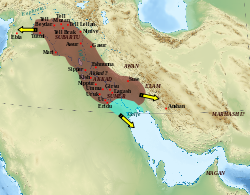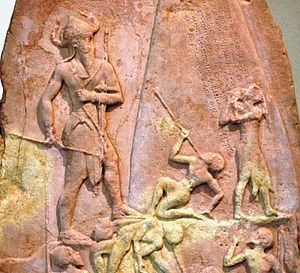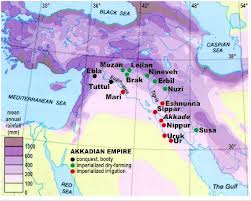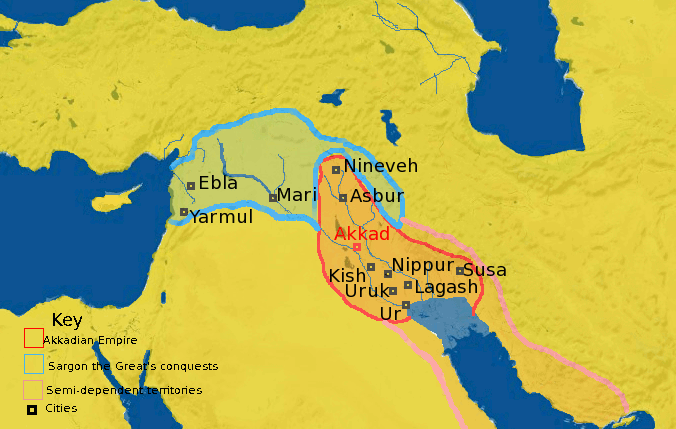



Text source: Wikipedia
Akkad
The Akkadian Empire /ЙҷЛҲkeЙӘdiЙҷn/[2] was an empire centered in the city of Akkad /ЛҲГҰkГҰd/[3] and its surrounding region in ancient Mesopotamia which united all the indigenous Akkadian speakingSemites and the Sumerian speakers under one rule.[4] During the 3rd millennium BC, there developed a very intimate cultural symbiosis between the Sumerians and the Semitic Akkadians, which included widespread bilingualism.[5] Akkadian gradually replaced Sumerian as a spoken language somewhere around the turn of the 3rd and the 2nd millennium BC (the exact date being a matter of debate).[6] The Akkadian Empire reached its political peak between the 24th and 22nd centuries BC, following the conquests by its founder Sargon of Akkad (2334вҖ“2279 BC). Under Sargon and his successors, Akkadian language was briefly imposed on neighboring conquered states such as Elam. Akkad is sometimes regarded as the first empire in history,[7] though there are earlier Sumerian claimants.[8] After the fall of the Akkadian Empire, the Akkadian peoples of Mesopotamia eventually coalesced into two major Akkadian speaking nations; Assyria in the north, and a few centuries later, Babylonia in the south.
Main article: Akkad (city) The precise archaeological site of the city of Akkad has not yet been found.[9] The form Agade appears in Sumerian, for example in the Sumerian King List; the later Assyro-Babylonian form AkkadГ» ("of or belonging to Akkad") was likely derived from this. The etymology and meaning of Akkad (written a.ga.dГЁKI or URIKI) are unknown. Centuries later, the neo-Babylonian king Nabonidus mentioned in his archaeological records[10] that Ishtar's worship in Agade was later superseded by that of the goddess Anunit, whose shrine was at SipparвҖ”suggesting proximity of Sippar and Agade. Despite numerous searches, the city has never been found. One theory holds that Agade was situated opposite Sippar on the left bank of the Euphrates, and was perhaps the oldest part of the city of Sippar. Another theory is that the ruins of Akkad are to be found beneath modernBaghdad. Reputedly it was destroyed by invading Gutians with the fall of the Akkadian Empire.[11] The first known mention of the city of Akkad is in an inscription of Enshakushanna of Uruk, where he claims to have defeated AgadeвҖ”indicating that it was in existence well before the days of Sargon of Akkad, whom the Sumerian King List claims to have built it.[12] Akkad is mentioned once in the TanakhвҖ”Book of Genesis 10:10: And the beginning of his [Nimrod's] kingdom was Babel, and Erech, and Accad, and Calneh, in the land of Shinar (KJV). The Greek (LXX) spelling in this passage is Archad.
Origins Speakers of the Akkadian language seem to have already been present in Mesopotamia at the dawn of the historical period, and soon achieved preeminence with the first Dynasty of Kish and numerous localities to the north of Sumer, where rulers with Akkadian names had already established themselves by the 3rd millennium BC. Sargon has often been cited as the first ruler of a combined empire of Akkad and Sumer, although more recently discovered data suggests there had been Sumerian expansions under previous kings, including Lugal-Anne-Mundu of Adab, Eannatum of Lagash, and Lugal-Zage-Si.
Link to Wikipedia Source
Text source: Wikipedia
Ш§ШөЩ„ Ш§Щ„ЩҶШө Щ…ЩҶ Щ…ЩҲЩӮШ№ Ш§Щ„ЩҲЩғЩҠШЁЩҠШҜЩҠШ§
Ш§ЩғШҜ
Ш§Щ„ШұШ§ШЁШ· ЩҒЩҠ Щ…ЩҲЩӮШ№ Ш§Щ„ЩҲЩҠЩғЩҠШЁЩҠШҜЩҠШ§
You are welocome to send your comments and proposals as well any useful photos, documents, links for website update using our following address:
Ш§Щ„ШөЩҒШӯШ© ШӘШұШӯШЁ ШЁШ§ЩҠШ© Щ…Щ„Ш§ШӯШёШ§ШӘ Ш§ЩҲ Щ…ЩӮШӘШұШӯШ§ШӘ ЩғЩ…Ш§ ШӘШӘШ·Щ„Ш№ Щ„Ш§ШіШӘЩ„Ш§Щ… Ш§ЩҠШ© ШөЩҲШұ Ш§ЩҲ ЩҲШ«Ш§ШҰЩӮ Ш§ЩҲ ШұЩҲШ§ШЁШ· Щ…ЩҒЩҠШҜШ© Щ„ШӘШӯШҜЩҠШ«ЩҮШ§ Ш№ШЁШұ Ш§Щ„Щ…ШұШ§ШіЩ„Ш© Ш№Щ„Щү Ш§Щ„Ш№ЩҶЩҲШ§ЩҶ Ш§Щ„Ш§Щ„ЩғШӘШұЩҲЩҶЩҠ Ш§Щ„ШӘШ§Щ„ЩҠ
info@uruk-warka.dk
Other updates ... ШӘШӯШҜЩҠШ«Ш§ШӘ Ш§Ш®ШұЩү
CITY-STATES OF ANCIENT - SUMER ... ШҜЩҲЩ„ Ш§Щ„Щ…ШҜЩҶ ЩҒЩҠ ШіЩҲЩ…Шұ